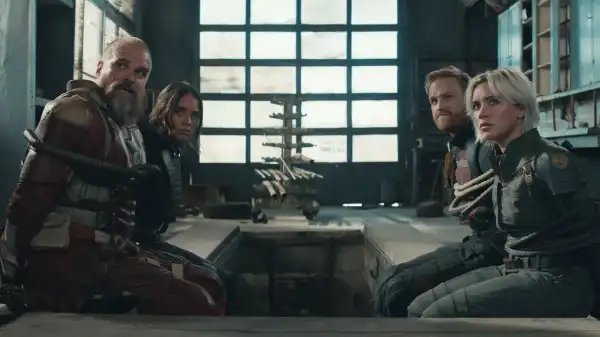
Save this storySave this storySave this storySave this story
In the lead-up to the May 2 release of The Thunderbolts, Marvel was lightly mocked for the arthouse feel of one of its trailers. Over a backdrop of edgy EDM, close-ups of Oscar-nominated actors Florence Pugh and Sebastian Stan were interspersed with strobing text reminiscent of various prestige offerings from indie studio A24. “From the stars of MIDSOMMAR, A DIFFERENT MAN, & YOU HURT MY FEELINGS,” the text read, which also credited “the writers and director of BEEF;” “the cinematographer of THE GREEN KNIGHT;” “the production designer of HEREDITARY;” “the editor of MINARI;” and “the composers of EVERYTHING EVERYWHERE ALL AT ONCE.” The screen briefly flashed to a man’s bare feet, abandoned lab equipment, and a giant chicken holding an arrow. “Lightning Strikes,” the clip concluded. A24 reposted the screenshots and added a Euphoria meme with the caption: “Wait, this is a fucking play about us?”
Marvel had been aggressively marketing Thunderbolts (the asterisk is never explained) as a course correction, a return to form after a string of critical and commercial failures. But rather than harkening back to the studio’s alien-fighting heyday, the trailer cleverly hinted at the film’s more indie sensibility, with its mix of cheeky banter, psychologically charged dream imagery, and mercurial self-contempt. Since 2008’s Iron Man, the Marvel Cinematic Universe has gobbled up Hollywood, integrating the hottest writers and directors, as well as a healthy dose of younger talent. The studio’s seemingly endless string of witty, lighthearted, half-ironic action films have successfully satisfied audiences’ superhero fantasies while also mocking them. Still, the franchise is struggling, and one reason for that (along with corporate venality and a preference for brand continuity over individual work) is that its gimmick is wearing thin. Marvel has always strategically eschewed the superhero genre — at least partly with a wink — but that position is becoming increasingly difficult to maintain as they continue to churn out superhero content, and the films get worse in the rush to prepare for future releases. Thunderbolts stands out because its rejection of superhero tropes feels genuine, not merely played out. The film oscillates between forms — a therapeutic drama, a cheeky meditation on family, and a two-hour sitcom — as if searching for a new creative frequency. It’s more fun than anything the studio has made in years.
Thunderbolts* begins on a note of existential malaise: Gott ist tot, and inspiration has left the earth. The main Avengers storyline ended in 2019 with the deaths or departures of Marvel’s major heroes—Captain America, Iron Man, Black Widow, and Thor, among others. The remaining characters feel as if the world’s well of meaning has dried up; the old institutions have crumbled, and no one is coming to save us.
Upping the absurdist ante: Veep's Selina Meyer is now the director of the CIA. Here, she has an Italian county and a new name, Valentina Allegra de Fontaine, but Julia Louis-Dreyfus plays her as a familiar study in brazen, articulate girl bossiness. Valentina's quest to create superhumans who can protect the world (and her interests) has led to unscrupulous, less-than-successful human experiments. Now the walls are closing in: She's being called on the carpet by The Wire's Detective Bunk (Wendell Pierce) — only here, he's a congressman named Gary — and some of her secret agents know too much.
These agents form a crew of misfits reminiscent of the ineffectual MI5 operators from the Apple TV+ show Slow Horses: lovable scoundrels who somehow manage to both fail at the top and thrive on the downs. Among them are sullen Russian spy Yelena Belova (Pugh) and John Walker (Wyatt Russell), a supersoldier who lost his role as Captain America about as quickly and spectacularly as Anthony Scaramucci lost his job as White House communications manager. Alongside them are Yelena’s exhibitionist father (a scene-stealing David Harbour); an everyman named Bob (Lewis Pullman), who, like Yelena, suffers from depression; and the Avenger-turned-politician who wrestles with the slow pace of institutional progress, played by Stan, whose presence, fresh off his portrayal of a young Donald Trump in The Apprentice, is an electric reminder that one man's superhero can be another man's demagogue.
But the main focus of this story is on mental health. (Spoilers ahead for those who appreciate the element of surprise in Marvel plots.) Bob, it turns out, is not just a regular guy.
Sourse: newyorker.com






